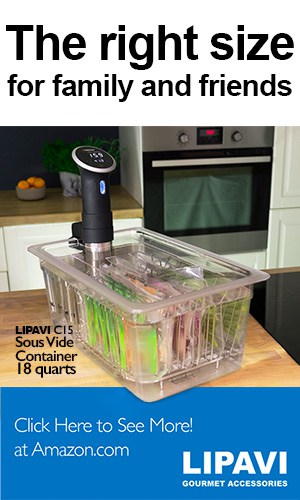-
Sous Vide Time and Temperatures
Sous Vide Time and Temps
Sous Vide Time and Temps
Sous Vide Temps
- All Sous Vide Temperatures
- Sous Vide Beef Temperatures
- Sous Vide Chicken Temperatures
- Sous Vide Duck Temperatures
- Sous Vide Fish Temperatures
- Sous Vide Vegetables Temperatures
- Sous Vide Infusions Temperatures
- Sous Vide Lamb Temperatures
- Sous Vide Pork Temperatures
- Sous Vide Shellfish Temperatures
- Sous Vide Turkey Temperatures
- Recipes Recipes Recipes Recipes
- Getting Started Guides Getting Started Guides Getting Started
- Equipment and Tools Equipment and Tools Equipment Equipment and Tools
- More Resources More Resources Resources More Resources
View All Molecular Gastronomy Glossary
Water soluble refers to the capacity to be dissolved or mix well in water. Substances which are water soluble are bound together by molecular forces which are weaker than usual. When exposed to a solvent such as water, these bonds may further weaken, eventually causing the connections to break.
While molecular bonds may naturally be weak, intermolecular forces such as energy must be present to break the bonds in a solute and disrupt those in the solvent. Energy becomes present when polar molecules from the solute form an intermolecular bond with polar molecules in the solvent. The energy that becomes present becomes sufficient to disrupt molecular structures in both substances. External energy may also be presented when a solution is mixed.
The solubility of a substance in water is dependent on how miscible, or mixable, it is. Certain substances are completely water soluble while others are only partially soluble.
Aside from miscibility, the amount of solvent and solute also plays a role in the degree of dissolution as well as concentration. Greater amounts of water surrounding a water soluble substance will result in quicker dissolution together with a weaker concentration and vice versa.
Many kitchen ingredients used in both traditional cooking and molecular gastronomy are water soluble.
Water Soluble
What is Water Soluble?
If something is water soluble, it will dissolve in water.Water soluble refers to the capacity to be dissolved or mix well in water. Substances which are water soluble are bound together by molecular forces which are weaker than usual. When exposed to a solvent such as water, these bonds may further weaken, eventually causing the connections to break.
While molecular bonds may naturally be weak, intermolecular forces such as energy must be present to break the bonds in a solute and disrupt those in the solvent. Energy becomes present when polar molecules from the solute form an intermolecular bond with polar molecules in the solvent. The energy that becomes present becomes sufficient to disrupt molecular structures in both substances. External energy may also be presented when a solution is mixed.
The solubility of a substance in water is dependent on how miscible, or mixable, it is. Certain substances are completely water soluble while others are only partially soluble.
Aside from miscibility, the amount of solvent and solute also plays a role in the degree of dissolution as well as concentration. Greater amounts of water surrounding a water soluble substance will result in quicker dissolution together with a weaker concentration and vice versa.
Many kitchen ingredients used in both traditional cooking and molecular gastronomy are water soluble.













